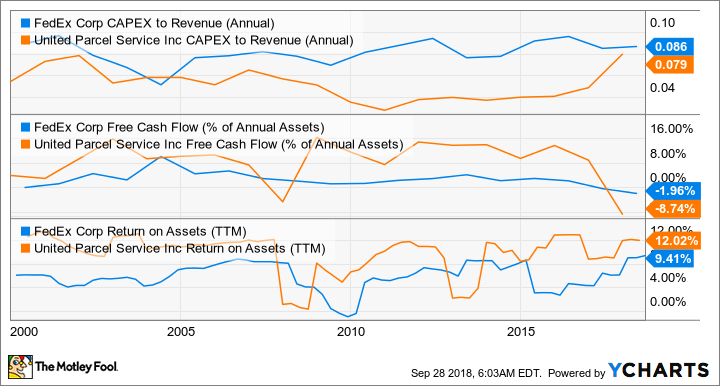Can UPS Stock Continue to Outperform FedEx?
After many years of underperforming its key rival, stock in United Parcel Service (NYSE: UPS) is up nearly 13% in the last six months compared with the flat performance of FedEx Corporation (NYSE: FDX). The question is whether it can continue. Let's take a look at the investment cases for both stocks -- you might be surprised by how different they are.
The big difference between UPS and FedEx
While the similarities between UPS and FedEx are obvious with a cursory view, a closer look reveals some substantial differences. Let's focus on two factors.

Image source: Getty Images.
First, FedEx runs separate air and ground networks, while UPS operates an integrated model, and FedEx management believes this is a key reason that it's outperformed UPS when it comes to meeting the challenges of peak demand -- FedEx's network has more flexibility.
Second, FedEx has historically spent relatively much more on its network than UPS, and partly as a consequence, UPS has traditionally generated a much better return on assets. In fact, across a whole range of metrics, UPS has tended to generate better returns from investment and assets.
The charts below show that FedEx has spent far more on capital expenditures as a share of revenue, and that UPS has tended to generate much more free cash flow (FCF) from assets and generally get a higher return on assets (net income divided by assets).
FDX CAPEX to Revenue (Annual) data by YCharts.
But that was then, and this is now, and the key to understanding the investment prospects for both companies is understanding how both companies are embarking on changes.
For FedEx Corporation, more is more
For FedEx, the key focus of the next few years will be on maximizing returns from its existing network, while also dialing down its capital spending plans and generating meaningful FCF. In a sense, its strategy is about making its existing assets (which include the TNT acquisition) work better rather than investing in new assets. There are three key things investors should focus on:
Management expects to grow FCF significantly in fiscal 2019 and "expect[s] to see increasing free cash flow in the future, as we realize the returns on our network investments," according to CFO Alan Graf on the recent first-quarter 2019 earnings call.
FedEx still plans to improve operating income by $1.2 billion to $1.5 billion from 2017 to 2020 largely as a consequence of synergies generated from the TNT acquisition -- for reference, non-GAAP adjusted operating income was $5.4 billion in 2017.
FedEx recently announced a plan to operate its network for six days a week all year round, without having the need to add any more facilities.
As COO David Bronczek discussed on the first-quarter earnings call, "Our significant investment in automation over the last decade has given us the flexibility and speed in the network to continue to expand even while we are reducing capital spending at FedEx Ground."
All told, the way to think of FedEx is in terms of a company that's already made, and continues to make, substantive investment in its network (including buying capacity through the TNT acquisition) but is now set to focus on improving profitability from it.
A different story at UPS
While FedEx might have been guilty of overinvesting in the past, that's certainly not the case at UPS. In fact, UPS arguably underinvested in the past and left its network underprepared for the pressures of e-commerce growth, particularly during peak season.
As such, UPS management was forced to disappoint investors earlier this year when it revealed it would have to meaningfully ramp up capital expenditures over the next few years -- implying FCF generation would drop. It was the first sign of the changes that UPS is making in order to improve performance.
Back in February, CFO Richard Peretz claimed capital expenditures would rise to "somewhere between 9% and 10%, 8.5% and 10% of revenues to stay" for the next few years. Fast forward to September, and UPS management announced a series of strategic initiatives intended to expand into new markets internationally, increase penetration in healthcare and life sciences, enhance services to the small and medium-size businesses market, and bring about "profitable expansion" in e-commerce deliveries.
All of these things require the kind of substantive investment suggested by Peretz's capital spending guidance, and in the next few years UPS intends to "add 350,000-400,000 pieces per hour of sortation capacity in the U.S. each year, which is about seven times the additional sortation capacity added in 2017, alone."
UPS or FedEx?
In a nutshell, UPS is catching up with investments that it arguably needed to do before, but the good news is it appears to be back on track now. Meanwhile, FedEx is trying to maximize profitability from its existing network
Frankly, it's a good story from both companies, and there's nothing to stop you from buying both stocks.
However, if forced to choose one or the other, I think FedEx is probably better placed to achieve its aims, not least because its management appears to be ahead of the curve with regard to what needs to be done to fully benefit from e-commerce growth -- while UPS appears to be reacting to events.
More From The Motley Fool
Lee Samaha has no position in any of the stocks mentioned. The Motley Fool recommends FedEx. The Motley Fool has a disclosure policy.

 Yahoo Finance
Yahoo Finance 
